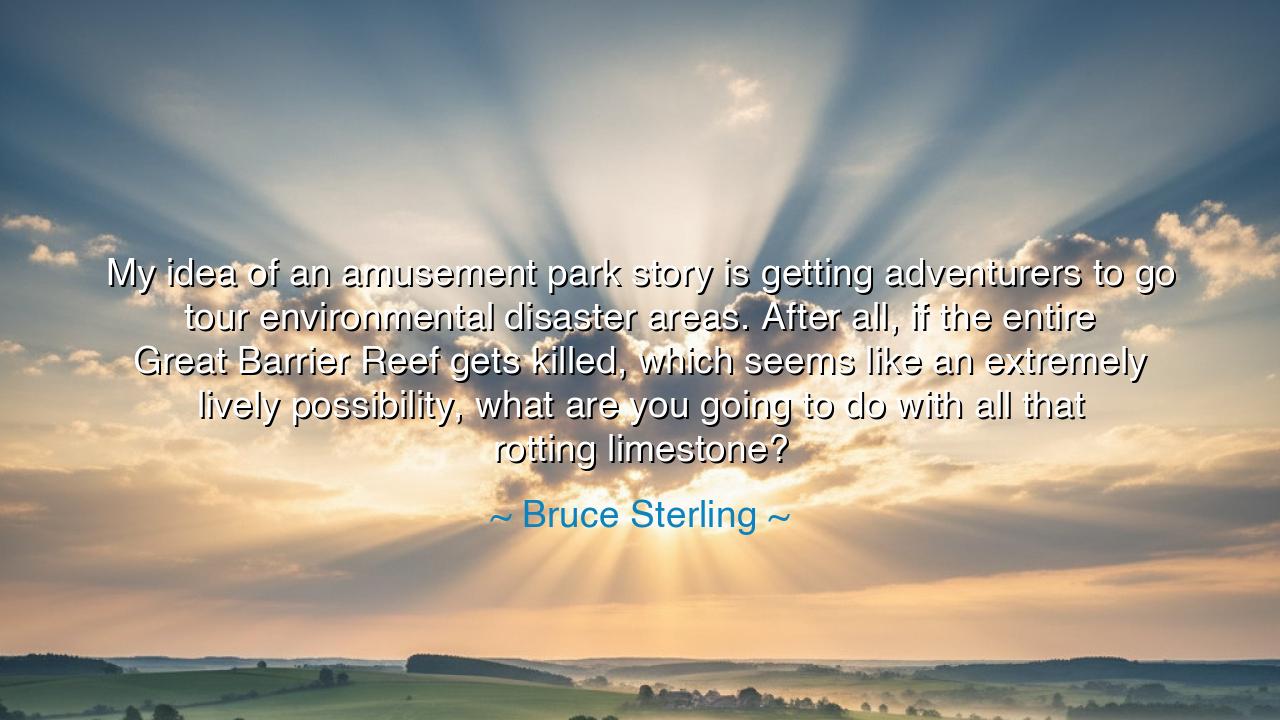
My idea of an amusement park story is getting adventurers to go
My idea of an amusement park story is getting adventurers to go tour environmental disaster areas. After all, if the entire Great Barrier Reef gets killed, which seems like an extremely lively possibility, what are you going to do with all that rotting limestone?






In the sharp and haunting words of Bruce Sterling, a prophet of technology and imagination, we hear a voice both satirical and sorrowful: “My idea of an amusement park story is getting adventurers to go tour environmental disaster areas. After all, if the entire Great Barrier Reef gets killed, which seems like an extremely lively possibility, what are you going to do with all that rotting limestone?” Behind the wry humor of this line lies a lament for the Earth and a warning for humanity — a cry against apathy in the face of our own undoing. Sterling, a visionary of the cyberpunk age, often wrote of futures twisted by human negligence, where wonder and horror coexist in uneasy harmony. Here, he imagines a world where ecological ruin itself has become spectacle — where what was once a paradise becomes merely a destination for morbid curiosity.
To understand the depth of Sterling’s words, we must see through the irony. He does not truly propose that the dead Great Barrier Reef become an amusement park; rather, he uses this image to confront us with our collective indifference. He sees the modern world’s fascination with consumption — how humanity, ever hungry for novelty, might one day treat the wreckage of nature as entertainment. The reef, one of the Earth’s greatest living treasures, teeming with color and life, becomes in his vision a corpse — a rotting limestone monument to human excess. In this bitter jest, Sterling reveals a terrifying truth: if we continue to treat the planet as a resource, we may soon live in a world where the only beauty left is the memory of what we destroyed.
The ancients, though they lacked our machines, understood the sacred bond between life and the land. They would have called Sterling’s warning the tale of hubris — the arrogance that blinds the mighty before their fall. Just as the kings of Babylon once believed their walls would stand forever, only to see their empire crumble into dust, so too does humanity build civilizations upon fragile foundations — oceans, forests, and air — as if they were endless. Sterling’s imagined “amusement park” is not a dream, but a prophecy of decline: a future where humanity tours its own ruins, marveling not at nature’s creation, but at the spectacle of its destruction.
Yet even in this grim image, there is a glimmer of moral awakening. By forcing us to picture tourists wandering through bleached coral skeletons, Sterling awakens conscience through shock. His words are not despair, but a provocation — a jolt meant to awaken empathy where comfort has made us numb. The Great Barrier Reef, once a symbol of Earth’s diversity and resilience, has already begun to fade under the strain of warming seas and pollution. Coral bleaching, caused by rising temperatures, is no longer fiction but fact. What Sterling foresaw as possibility has begun to unfold before our eyes, not as spectacle, but as tragedy. His irony now sounds less like sarcasm and more like mourning.
Throughout history, artists and thinkers have used satire to reveal truths that polite speech cannot. Like Jonathan Swift, who once proposed that the poor sell their children as food to shame the apathy of his society, Sterling uses absurdity to expose moral decay. By turning the death of ecosystems into an “amusement park,” he mirrors our real-world behavior — the way people travel to dying glaciers or burning forests for selfies, rather than to help. His words are a mirror held up to the modern soul: a reflection of what happens when curiosity outlives compassion.
The lesson in this is clear, though painful. We must not let our relationship with the natural world become one of spectatorship. The Earth is not a museum for our pity, nor a playground for our greed. It is a living body — ancient, fragile, and sacred. To stand by while the seas rise and the reefs crumble is to become the kind of traveler Sterling mocks: one who admires the scenery of ruin without recognizing their own hand in it. The Great Barrier Reef, and all the wonders like it, are not yet lost — but they are crying out for guardians, not tourists.
And so, my children of the modern age, take this teaching to heart: do not wait until beauty becomes relic before you defend it. When you behold the forests, the rivers, the reefs, see not commodities, but kin — living threads in the fabric that sustains us all. Let your curiosity lead to action, your awe to stewardship, your wonder to responsibility. For if we fail to change, Sterling’s dark vision may become our inheritance — a world where the monuments of nature have turned to stone, and humanity, blind and restless, tours the graves of its own creation.
Let his irony be our awakening. Let his prophecy be undone by our courage. For the Earth still breathes, though faintly — and if we listen, if we act, her laughter, not her ruins, may yet become the story we pass to future generations.






AAdministratorAdministrator
Welcome, honored guests. Please leave a comment, we will respond soon